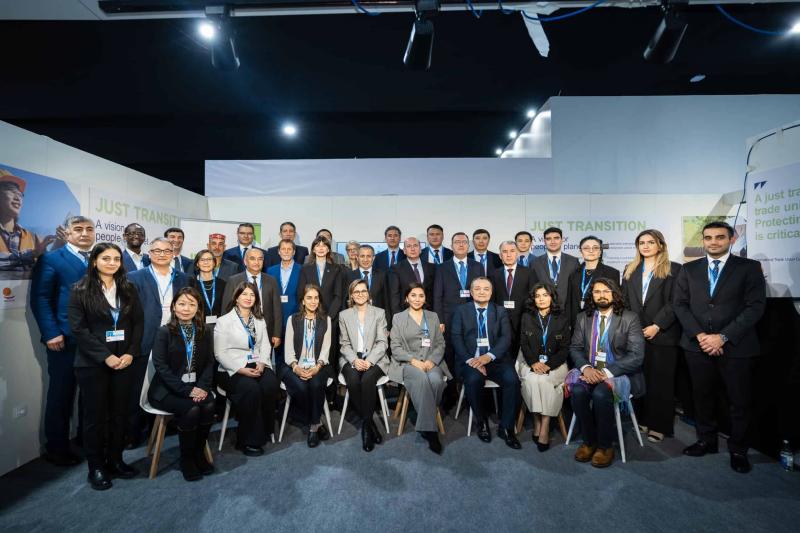

Hosted at the ILO Just Transition Pavilion, on 20-21 November 2024, at COP29, in Baku, Azerbaijan, the United Nations Partnership for Action on a Green Economy (PAGE) and its partners put forward the debate on a just transition for all to enhance ambition and to build the required social consensus for implementing bold climate measures.
Titled “From Vision to Practice for a Just Transition for All: a cross-regional South-South Policy Dialogue on energy, sustainable finance, and enterprises for inclusive policy-making processes and enhancing NDC ambition”, the event consisted of two policy dialogues, which aimed to create synergies and connections among governments, employers, workers, and key climate actors in the margins of COP29.
One of the outcomes of the policy dialogues is the establishment of a technical working group that includes Azerbaijan and Central Asian countries. This group aims to collaborate on NDC contributions and position papers for COP30, while also expanding a knowledge network with Asian nations, Brazil, and other countries in Europe region to foster South-South and Triangular Cooperation.
Climate change is one of the largest and most complex existential challenges of our time, outpacing predictions and placing immense strain on global communities, labour markets, businesses and workplaces. COP29 represents one of the last major chances to get the world back on track and hold nations accountable for delivering on their environmental targets, with a focus on ensuring developing nations receive adequate support.
This two-day event focused on encouraging policy discussions among Central Asian, South Caucasian, and Asia Pacific nations (both PAGE and non-PAGE countries) regarding the promotion of green jobs, sustainable businesses, and circular approaches for a fair transition. It aimed to incorporate the perspectives of workers and employers in the formulation of Nationally Determined Contributions (NDCs), investigated equitable energy transition scenarios, and proposed sustainable financing policies.
Participants shared the best practices and addressed existing capacity gaps. Furthermore, it fosters peer learning on the integration of just transition and sustainable enterprise considerations into NDCs, along with enhancing South-South collaboration. The discussion covered policy recommendations for strengthening Nationally Determined Contributions through the consideration of sustainable financing, just transition, biodiversity, sustainable development and green economy.
By using a South-South and Triangular Cooperation (SSTC) approach, the event fostered mutual learning and collaboration among countries facing similar challenges and opportunities. It included stakeholders from Europe and Central Asia region, Asia and the Pacific region, Arab States, and Latin-American region, UN-PAGE agencies (UNDP-UNEP-UNIDO-UNITAR-ILO), UNESCAP, ASEAN, the UN Issue-based coalition Environment and Climate Change of Europe and Central Asia, representative of employers and workers as well as representative from the private sector.
Originally published on www.un-page.org